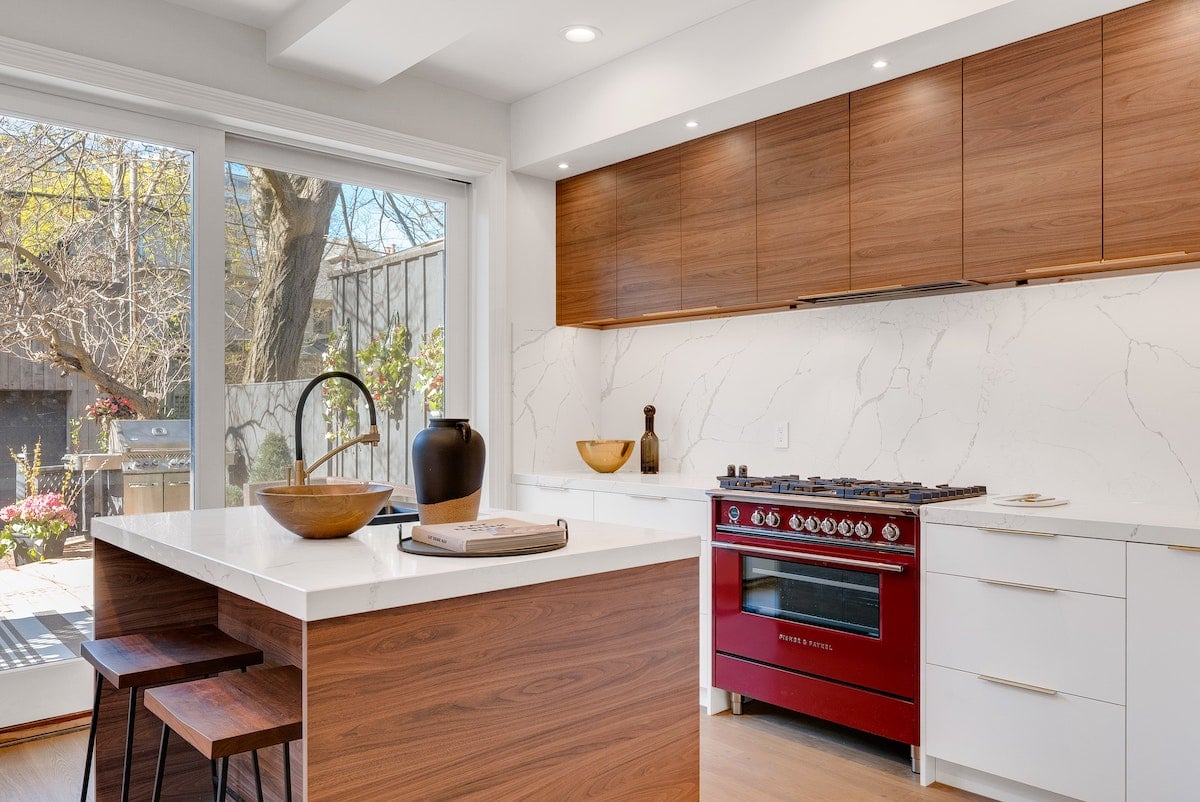Table of Contents
One of the most popular materials for making office and kitchen countertops is quartz. Such furniture is 95% natural stone, and the remaining 5% is a polyester resin and a coloring pigment, such as arctic white or iced white (about 2%}, which makes the countertop more durable and attractive. Quartz, although an artificial stone, but in fact, we will begin to match natural ones, and sometimes even surpass them in terms of performance.
Currently, the stores offer a large selection of quartz countertops. They come with a glossy, matte, or rough surface. The pattern can imitate natural stone, wood, and the most popular and best colors of quartz countertops are solid colors.
Sheets of quartz are often produced with a thickness of 12, 13, 15, 20, and 30 mm. Plates 12, 13, and 15 mm are suitable for wall panels, facing steps, and fireplaces. For work surfaces, it is most often recommended to purchase products from plates with a thickness of 20-30 mm, since a smaller thickness will not provide sufficient strength for a tabletop that does not lie on a solid base.
Quartz countertops are ideal for kitchen, bathroom, bedroom, and living room as well as office interior. But such a popular and versatile material has its pros and cons. When choosing, it is necessary to take into account all factors, since the material is not the cheapest and it is very important not to make a mistake.
Benefits of quartz countertops
Countertops made of broken stone are practically not afraid of mechanical damage; they rarely show chips and scratches. Moreover, quartz is non-porous and therefore resists stains, making it a hugely useful material to have in your kitchen. Since quartz is a hard stone, which is obtained using Breton technology, which allows you to combine hard quartz crumbs back into stone. In addition to all this, such countertops are not prone to cracking, do not dry out and do not swell from moisture, and are not subject to deformation processes. Therefore, quartz products are preserved in their original form for decades.
Quartz countertops for the kitchen have the following advantages:
1) Not affected by high temperatures. A hot pot placed on a quartz countertop will not leave marks or deform it.
2) Quartz does not absorb dirt and moisture. Because there are no pores and microcracks inside the material. In this, quartz surpasses even granite.
3) Due to the fact that quartz countertops are resistant to mechanical damage, food can be cut on them without spoiling their original appearance.
4) Simply increase the work surface – you can also order a custom cut granite or a quartz window sill, making it flush with the countertop. This is a practical and stylish solution for the kitchen. Aprons for kitchen sets are made of the same material, it is beautiful and makes cleaning even easier. At the same time with the countertop, you can order a quartz plinth that will not melt when the hob approaches.
5) Quartz surfaces are fairly easy to care for. You can simply wipe the surface with a cloth dampened with soapy water.
Further benefitis
Quartz bath countertops have the same benefits. In addition to this, fungus and mold will not appear on them, since quartz has a dense structure. They also do not absorb or retain odor. Countertops made of this material do not cause allergies, do not emit anything into the atmosphere even when heated, and cannot harm people and pets. Unlike natural granite, quartz does not create background radiation.
Another advantage of countertops is the variety of colors, some of the most popular are gray quartz countertops and black quartz countertops. The pigment allows you to achieve an exact resemblance to natural stone – marble, granite. The pattern and texture of the countertop depend not only on the color but also on the size of the quartz chips. Please note: if you want to get an inexpensive quartz countertop, then choose a simpler pattern, and if you want to get a complex texture, then get ready to pay more.
Disadvantages of quartz countertops
1) Cold to the touch, which can be uncomfortable, especially in the bathroom.
2) High price due to the use of special stone-cutting and grinding equipment, professional services will also be required. With a complex configuration of the product, for example, the presence of a figured edge, the price of the finished tabletop immediately increases.
3) Depending on the pattern, seams may be visible on the tabletop. As a rule, the larger the picture, the more noticeable the discrepancy in the pattern.
4) Quartz is almost impossible to restore, therefore, in case of large damage, for example, large chips, and cracks, which sometimes appear during prolonged exposure to high temperatures, a complete or partial replacement of the countertop will be required.
5) With direct exposure to sunlight for a long time, the surface may burn out, usually, this does not happen, so this fact should be taken into account when planning a kitchen on the sunny side of the apartment.
6) The high cost of quartz and its processing compared to chipboard, wood, or acrylic stone.
7) It is impossible to implement all design solutions, for example, to order a product with a bent shape.
Having studied all the pros and cons of quartz, we can safely say that this material has more positive qualities since neither natural stone nor acrylic can compare with it in terms of strength, durability, beauty, and at the same time practicality. A quartz countertop will be an excellent addition to the design of your apartment and will delight you for a very long time.


